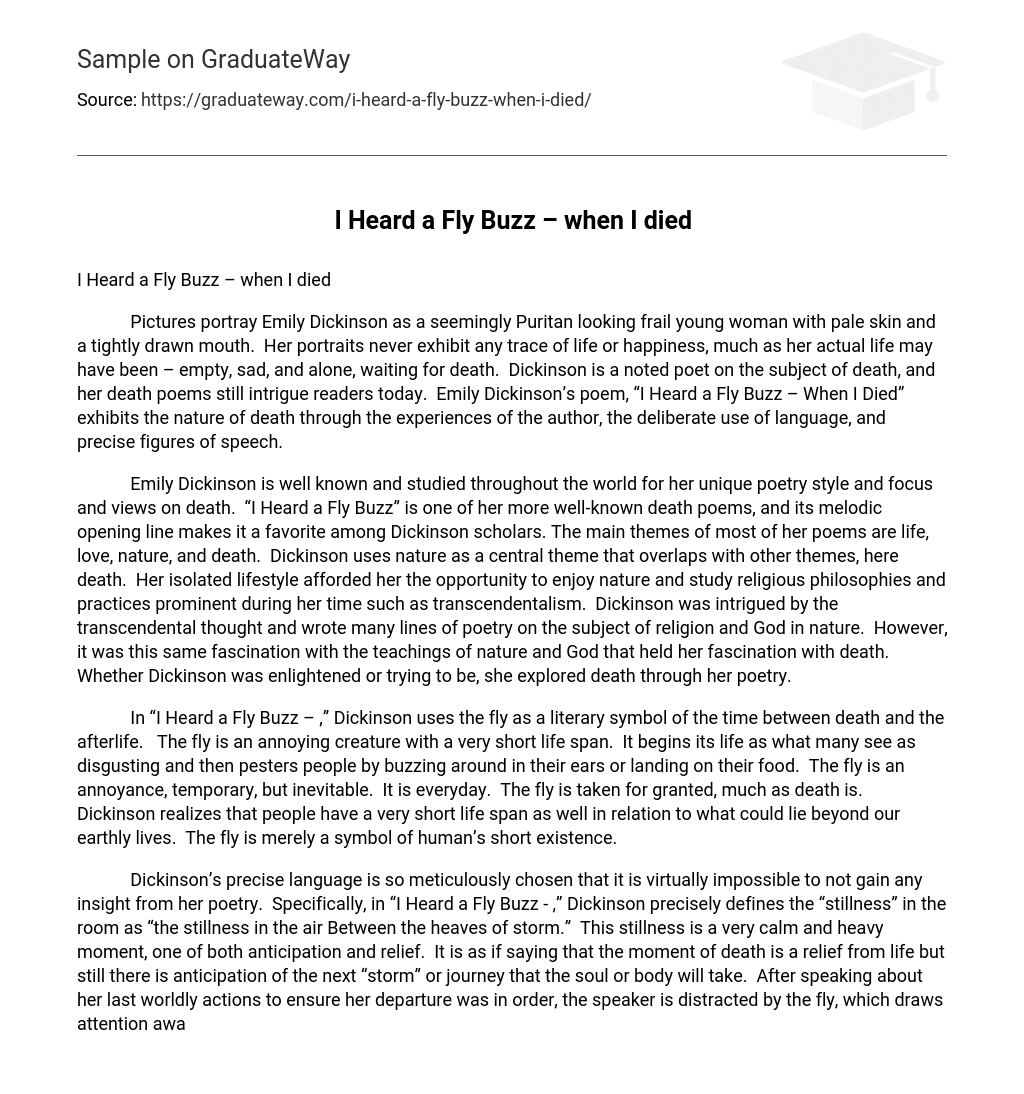Pictures portray Emily Dickinson as a seemingly Puritan looking frail young woman with pale skin and a tightly drawn mouth. Her portraits never exhibit any trace of life or happiness, much as her actual life may have been – empty, sad, and alone, waiting for death. Dickinson is a noted poet on the subject of death, and her death poems still intrigue readers today. Emily Dickinson’s poem, “I Heard a Fly Buzz – When I Died” exhibits the nature of death through the experiences of the author, the deliberate use of language, and precise figures of speech.
Emily Dickinson is well known and studied throughout the world for her unique poetry style and focus and views on death. “I Heard a Fly Buzz” is one of her more well-known death poems, and its melodic opening line makes it a favorite among Dickinson scholars. The main themes of most of her poems are life, love, nature, and death. Dickinson uses nature as a central theme that overlaps with other themes, here death. Her isolated lifestyle afforded her the opportunity to enjoy nature and study religious philosophies and practices prominent during her time such as transcendentalism. Dickinson was intrigued by the transcendental thought and wrote many lines of poetry on the subject of religion and God in nature. However, it was this same fascination with the teachings of nature and God that held her fascination with death. Whether Dickinson was enlightened or trying to be, she explored death through her poetry.
In “I Heard a Fly Buzz – ,” Dickinson uses the fly as a literary symbol of the time between death and the afterlife. The fly is an annoying creature with a very short life span. It begins its life as what many see as disgusting and then pesters people by buzzing around in their ears or landing on their food. The fly is an annoyance, temporary, but inevitable. It is everyday. The fly is taken for granted, much as death is. Dickinson realizes that people have a very short life span as well in relation to what could lie beyond our earthly lives. The fly is merely a symbol of human’s short existence.
Dickinson’s precise language is so meticulously chosen that it is virtually impossible to not gain any insight from her poetry. Specifically, in “I Heard a Fly Buzz – ,” Dickinson precisely defines the “stillness” in the room as “the stillness in the air Between the heaves of storm.” This stillness is a very calm and heavy moment, one of both anticipation and relief. It is as if saying that the moment of death is a relief from life but still there is anticipation of the next “storm” or journey that the soul or body will take. After speaking about her last worldly actions to ensure her departure was in order, the speaker is distracted by the fly, which draws attention away from the speaker at the moment she is recalling her worldly possessions and life and the matters that she had to see to before she could move on. “I willed my keepsakes, signed away What portion of me I Could make assignable,-and then There interposed a fly,”
The fly is also used metaphorically as a symbol of that time between the end of life and beginning of death, a very brief time where things are fuzzy or buzzing through our heads and minds. A time when we recapture the last moments of our lives and our surroundings. Dickinson writes, “With blue, uncertain, stumbling buzz, Between the light and me;”. Here the speaker is not literally referring to a fly, but the time between either the end of her life and the beginning of death or the end of her ignorance and the moment of her enlightenment (the light). In many of Dickinson’s poems, there seems to be something between the speaker and either enlightenment or death.
Symbolically, the fly is much more than a flying insect swarming around a dying body. It is a moment in time. It is a nagging anticipation. It is a part of both life and death that Emily Dickinson could not figure out. “And then the windows failed, and then I could not see to see.” The windows, being the eyes to the soul, fail the speaker, either on her literal death or the time of her seeking enlightenment or truth. At this point, the speaker is dead and passed to the next place and cannot see the past or the world and cannot relate any further or she cannot gain enlightenment or truth. She cannot see the truth. She is blinded.
“I Heard a Fly Buzz – When I Died” is not a poem about a fly. It is a poem about death – either a physical or a mental death where the speaker undergoes a time between that death and a new awakening. It is the blurry, fuzzy part that ruminates in her head like a fly that will not allow her to either focus on her preparation for death or truth or her actual passage to that place.





